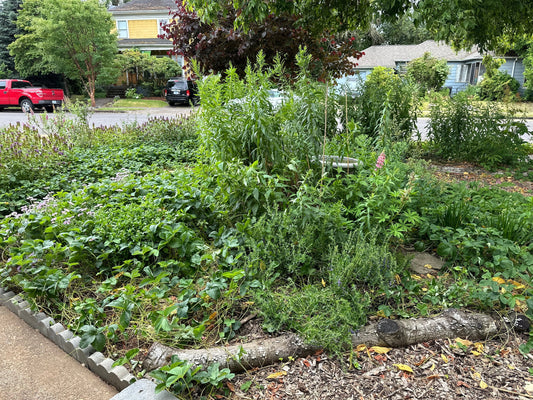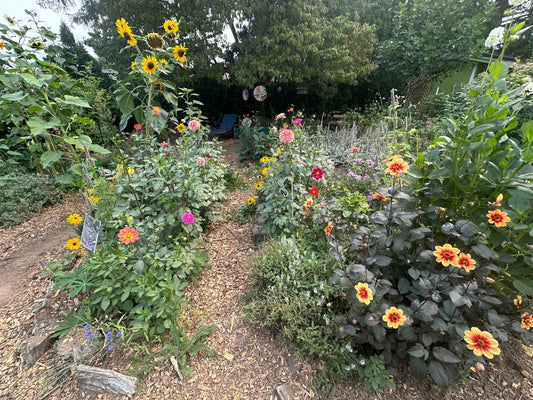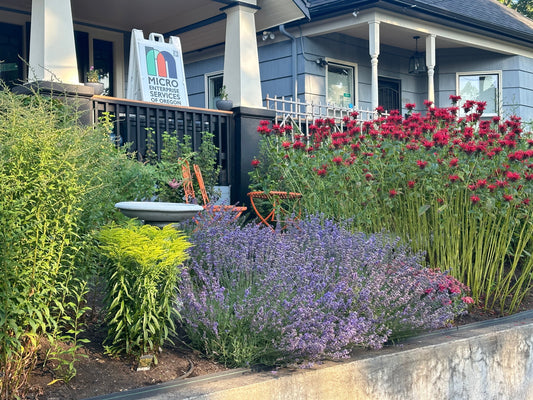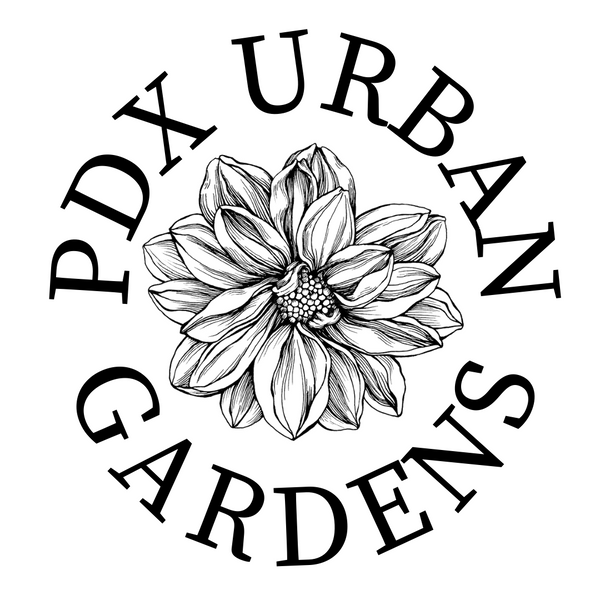
Installation

Garden Installation
Edible Gardens & Food Forests
Backyard food forests fruit & nut trees, berry hedgerows, perennial vegetables, edible mushrooms
Kitchen & herb gardens culinary and medicinal herbs, companion plant guilds
Edible meadows, lawn alternatives, & permaculture beds deep-mulch, no-till food production
Native Habitat Gardens
Wildflower meadows native flowering plants for year-round blooms, drought tolerant
Butterfly & bee gardens milkweed, nectar plants, and host species
Bird & wildlife corridors berry-producing shrubs, seed heads, and nesting habitat
Water-Wise Landscaping
Rain gardens & bioswales natural stormwater filtration and erosion control
Dry creek beds & rock gardens aesthetic, slope stabilization, functional drainage solutions
Drought-tolerant landscapes xeriscaping, deep-rooted native plants
Projects
View all-

St Johns Silver Certified Backyard Habitat, Foo...
In 2022 we completely changed this front and backyard into a mix of 34 habitat and food forest plantings. As of September 4, 2024 this landscape is a Silver certified Backyard Habitat,...
1 commentSt Johns Silver Certified Backyard Habitat, Foo...
In 2022 we completely changed this front and backyard into a mix of 34 habitat and food forest plantings. As of September 4, 2024 this landscape is a Silver certified Backyard Habitat,...
1 comment -

North Gresham Food Forest, Medicine Garden, & C...
This 1/3 acre property is now packed with 46 different species of food, medicinals, natives, and cut flowers. You can expect to brush up against swaths of hyssop, yarrow, dahlias, lupine, and...
North Gresham Food Forest, Medicine Garden, & C...
This 1/3 acre property is now packed with 46 different species of food, medicinals, natives, and cut flowers. You can expect to brush up against swaths of hyssop, yarrow, dahlias, lupine, and...
-

NE Portland MESO Offices' Backyard Habitat, Pol...
This bare 1400 sqft front yard was replanted with 22 species of native, edible, pollinator, and cut flower plants. Complete with a stone pathway, bird baths, and plant signs.
NE Portland MESO Offices' Backyard Habitat, Pol...
This bare 1400 sqft front yard was replanted with 22 species of native, edible, pollinator, and cut flower plants. Complete with a stone pathway, bird baths, and plant signs.

Why clients choose us
- You want to transform your yard into a thriving, low-maintenance ecosystem
- You’ve got a vision (or a design) and need help bringing it to life
- You care about using native plants, growing food, and working with the land—not against it
- You need flexible options—phased installs, DIY support, or full-service build-outs
The process
Consultation & Site Visit
We meet on-site to walk the land, review your design (or help create one), and align on goals, timing, and budget.
Custom Bid
You’ll receive a detailed bid tailored to your site, including plant list, materials, and optional phases.
Installation
Upon approval of the bid and contract having been signed, we will complete the scope of work.





FAQ
How much does an installation cost?
Most projects range from $1,500–$20,000+, depending on the size of the site, the complexity of the design, and the materials involved. We also offer phased installation options and DIY support to fit your budget.
Do I need a full design before getting started?
A design helps us give you an accurate estimate and install the right plants and systems for your site. You can bring your own plan or work with us to create one.
Can you help me install part of the project while I do the rest?
Definitely. We’re happy to support hybrid installs—like prepping beds, sourcing plants, project management, or setting up key systems—while you handle the rest at your own pace.
What areas do you serve?
We work primarily in the Portland metro area and nearby communities. For larger or mission-aligned projects, we may travel farther—just reach out to see what’s possible.
What makes your landscaping approach ecological or regenerative?
We focus on working with nature - not against it. That means using native and edible plants, building healthy soil, reducing inputs like irrigation and fertilizers, and creating spaces that support pollinators, wildlife, and people. Our goal is to design and install systems that improve over time, require less maintenance, and contribute to a more resilient local ecosystem. Our approach is heavily influenced by principles of permaculture and Traditional Ecological Knowledge.



